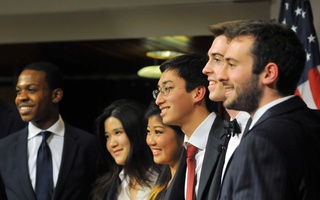Undergraduate Council leaders took a more reserved approach in outlining their goals for the fall semester, conceding that their goal to secure more funding for student groups will likely stay unfulfilled during their tenure, even as they introduced a broad plan to increase student voice in faculty and administrative decisions.
UC President Gus A. Mayopoulos '15 and Vice President Sietse K. Goffard '15 explained in an interview Monday that although they will continue working with the Office of Student Life and relevant administrators to access student group funding, any changes would likely take shape after their tenure ends in December.
“Realistically, there is a very good chance that this will not be resolved...by the time our term ends,” Mayopoulos said.
The UC allocates grants to officially recognized student groups and initiatives through its annual budget of about $500,000, which is funded largely by a $75 term bill fee. While Mayopoulos and Goffard met with University officials and hosted a rally last semester to lobby for more funding, they say the OSL is responsible for a majority of the remaining work.
Following a meeting last spring in which Dean of the Faculty of Arts and Sciences Michael D. Smith reportedly expressed desire for more data on club funding, Mayopoulos and Goffard said the OSL would work over the summer to gather the relevant information. Mayopoulos affirmed on Monday that the UC will be meeting with new Dean of the College Rakesh Khurana and OSL deans to discuss possible future recommendations.
And while Mayopoulos admitted he was “disappointed” at the pace of the negotiations, he and Goffard still expressed optimism.
“It’s not at all like we’re giving up,” Goffard said. “Getting the funding now looks more likely than it ever has been in the past.”
Focusing on what they see as another major student concern, the two also unveiled goals to change the role of the UC in facilitating student input for administrative decisions.
Citing student outrage caused by an administrative decision to withhold Q Guide difficulty ratings, Mayopoulos said “the UC cannot continue to be a reactive body.”
Both he and Goffard outlined broad plans to incorporate student voice into faculty votes by allowing undergraduates to view items to be voted on by the Faculty Council and submit statements conveying their opinion.
Meanwhile, UC Student Relations Committee Chair Ava Nasrollahzadeh '16 said that her group hopes to increase effective communication about the UC’s work, both internally and to all undergraduates.
“Where SRC is going to focus is really effectively communicating our advocacy work,” Nasrollahzadeh said of her broad goal.
Mayopoulos and Goffard also announced a new Charlie Card and Harvard University ID integration program prepared to launch later this semester.
Harvard Transportation Services is expected to provide more details on the program later this month, Mayopoulos and Goffard said.
—Staff writer Noah J. Delwiche can be reached at noah.delwiche@thecrimson.com. Follow him on Twitter @ndelwiche.
Read more in College News
Leverett House Resident Dean Will Take Leave to Join Ad BoardRecommended Articles
-
 Three Tickets Face Off in UC Presidential Debate
Three Tickets Face Off in UC Presidential Debate -
Chaotic Election Behind Them, New UC Leaders Outline First InitiativesIn an email to undergraduates Friday, UC President Gus A. Mayopoulos ’15 and Vice President Sietse K. Goffard ’15 detailed three new initiatives that they plan to implement as their term gets underway.
-
 UC Will Meet With Smith To Request Increased Funding
UC Will Meet With Smith To Request Increased Funding -
Despite Support, Smith Says University Will Not Fund UC Budget Increase this YearFollowing a meeting Monday with Dean of the Faculty of Arts and Sciences Michael D. Smith, top Undergraduate Council leaders said that their request for a 50 percent increase in funding for student activities this year from the University was denied, even as Smith voiced support for their efforts and discussed funding possibilities for the future.
-
In Response to Anonymous Op-Ed, UC Forms Sexual Assault Policy Task ForceThe UC has formed a task force to involve students in the discussion on Harvard’s sexual assault policies in response to a first-person, anonymous op-ed published in The Crimson.













